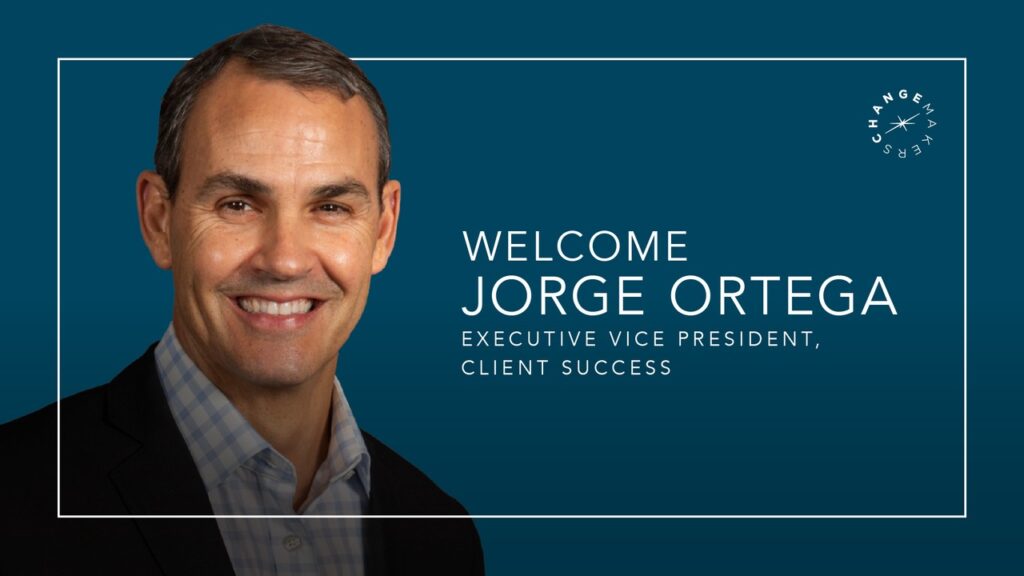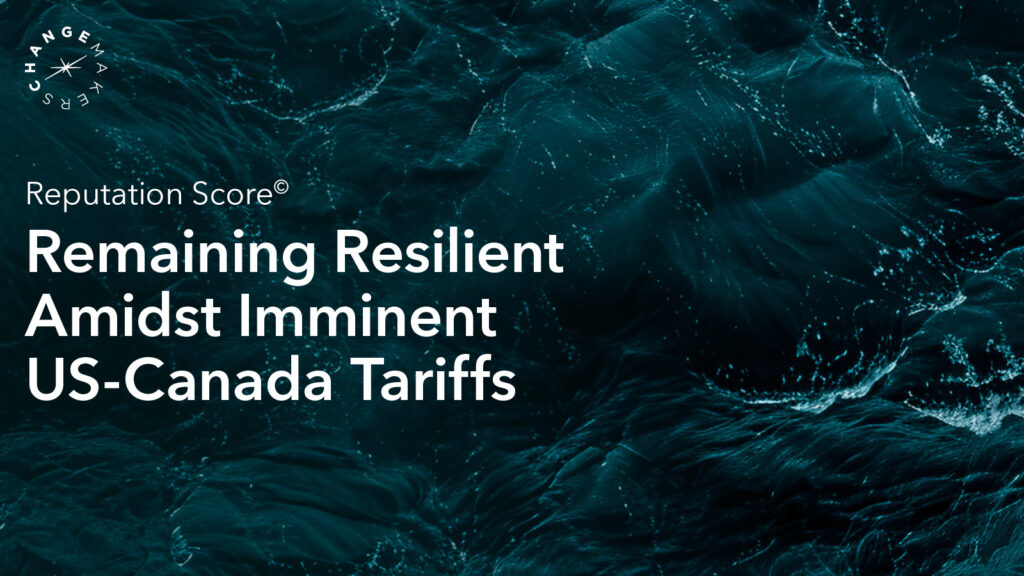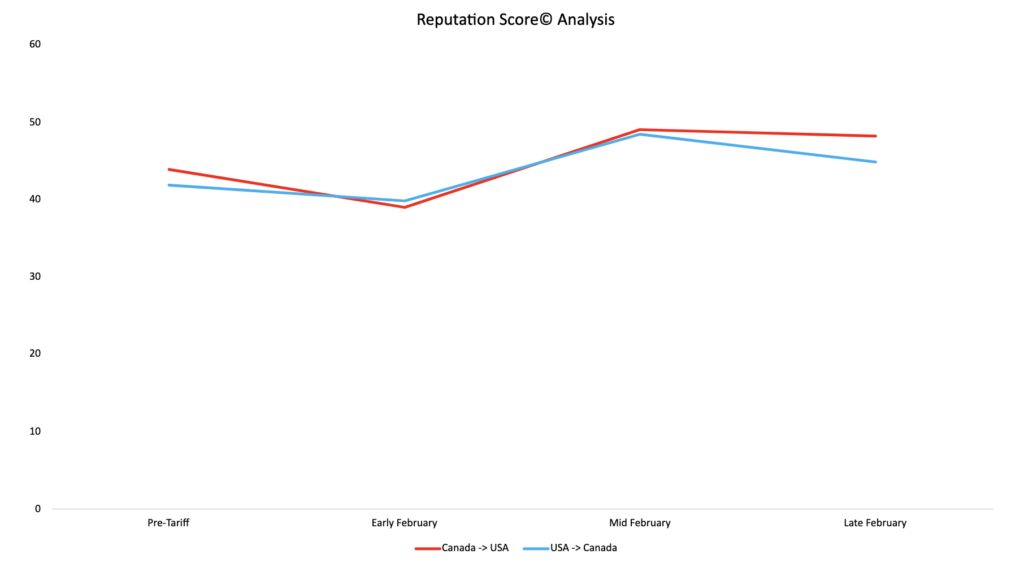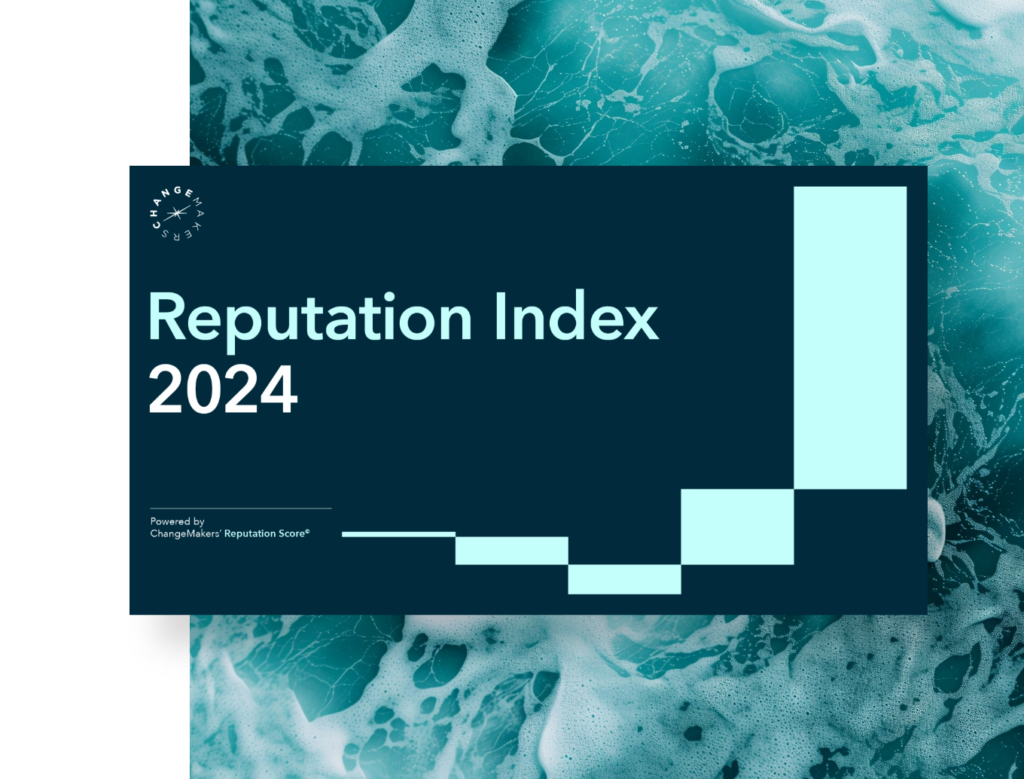What complex challenges can we help you navigate?
Email us:
health@thechangemakers.com

WASHINGTON, D.C. (April 10, 2025) — ChangeMakers, a leading North American communications and marketing firm focused on reputation and social impact, has appointed Jorge Ortega as Executive Vice President, Client Success and a member of the firm’s U.S. leadership team.
A former senior leader at two multinational agencies, Ortega brings decades of experience advising public and private sector clients on CEO communications, leadership development, brand strategy, and crisis response. He will report to Robert Gemmill, President of ChangeMakers, USA.
“Jorge is a major addition to the ChangeMakers team,” Gemmill said. “The trust he has earned from C-suite executives is evident by his deep relationships and broad experience across sectors. His leadership will be key as we grow our U.S. business and deliver the results our partners expect.”
Ortega joins ChangeMakers from CRA | Admired Leadership, where he served as Managing Director. He previously led Edelman’s southwest region and held senior roles at Burson. His career spans reputation strategy, brand communications, and high-stakes crisis response.
“Jorge’s appointment reflects our commitment to building a leadership team with both insight and impact,” said Mario Simon, CEO of ChangeMakers. “His integrity and experience align with our mission to navigate complexity for our clients.”
Ortega joins the ChangeMakers U.S. team, which specializes in helping clients anticipate and navigate complex, high-stakes communication situations. The firm uses its proprietary Reputation Score© AI platform to inform counsel and to measure and predict reputational impact in real time.
“I’m eager to bring my experience advising global clients to help ChangeMakers grow and deliver meaningful results,” Ortega said.
About ChangeMakers
For more than 40 years, ChangeMakers has helped organizations solve complex communications challenges by blending strategy, creativity, and insight. With more than 400 professionals across 10 locations in North America, we partner with clients to build stronger brands, navigate change, and drive meaningful impact. From corporate reputation and brand storytelling to social purpose and executive advisory, ChangeMakers brings together diverse expertise to help clients lead with confidence and clarity.
At ChangeMakers, we are committed to protecting your privacy of visitors to our website: thechangemakers.com (the “Website”). This Privacy Policy outlines our practices regarding the collection, use, and disclosure of your information when you visit our Website.
Please read this Privacy Policy carefully to understand how we will treat your information before you start to use our Website, our services, or communicate with us. By using our Website, our services, or communicating with us, you acknowledge that your Personal Information will be processed in accordance with this Privacy Policy, including any updates and amendments. Your use of our services is also subject to any applicable terms of use, including any terms available at (“Terms of Use“).
We collect the following types of information:
Information You Provide
We collect information you voluntarily and manually provide when you use our Website, such as when you purchase or access services or certain content on our Website, sign up for our email list or newsletter, submit a form, send us questions, or interact with us through this Website. Some of the information you manually provide may be personal information, such as your name or email address.
Information from Your Website Browser or Mobile Device
We collect information that is sent to us automatically from your browser or mobile device, such as your IP address, the name of your operating system, the name and version of your browser, date and time of your visit, page(s) you visit and length of time you spent on each page. The information we receive may depend on your browser or device settings. Information received from your browser and mobile device typically is not, in and of itself, personally identifiable. However, we may combine it with other information that does identify you.
Tracking Technologies
Use of Google Analytics
This website uses Google Analytics, a web analytics service provided by Google, Inc. (“Google”). Google Analytics uses cookies to analyze activities on and use of the Website to improve the navigation, content, and design of the Website. The information generated by the cookie about your use of this site (including your IP address) will be transmitted to and stored by Google on servers in the United States. Google will use this information for the purpose of evaluating your use of this site, compiling reports on website activity and providing other services relating to website activity and internet usage. Google may also transfer this information to third parties where required to do so by law, or where such third parties process the information on Google’s behalf. By using this website, you consent to the processing of your data by Google as described. For more information on Google Analytics, you can visit Google’s Privacy Policy.
Use of Cookies
This Website uses third-party tracking cookies to monitor website traffic and user engagement and provide visitors with tailored information upon each visit. Cookies are a common part of many commercial websites that allow small text files to be sent by a website, accepted by a web browser and then placed on your hard drive as recognition for repeat visits to the Website. Every time you visit the Website, our servers, through cookies, pixels and/or GIF files, collect basic technical information such as your domain name, the address of the last URL visited prior to clicking through to the Website, and your browser and operating system. You do not need to enable cookies to visit the Website; however, disabling cookies may affect your experience and limit some functionalities of the site. Some cookie files remain on your computer’s hard drive unless and until you manually delete the file.
How We Use and Disclose Your Personal Information
Consent
We may process your Personal Information where we have your consent to do so, such as communicating with you about an event you attended or campaign you were involved in. You have a right to withdraw your consent at any time but doing so may prevent us from providing a service to you or responding to a request that you have made.
To Perform a Contract with You
We may use your Personal Information to perform a contract with you or take steps at your request prior to entering into such a contract. This processing may include providing you with information, products, and services.
Analytic Purposes
We may process your Personal Information where necessary for product development, algorithmic model improvement, and statistical analysis to improve our services and Website experience. For model development and statistical analysis, we make every reasonable effort to use anonymized or de-identified information where possible and have implemented best practices to limit the use of your Personal Information for analytic purposes.
Otherwise Required by Law
We may disclose your Personal Information including information about you or your use of the Website where required by law, including where necessary to protect the vital interests of an individual or to satisfy any applicable law, regulation, legal process or lawful governmental request.
Disclosure to Third Parties
We may provide your Personal Information to third party service providers on an as-needed basis. We require all such third parties to respect the security of your Personal Information and to treat it in accordance with the law. We do not allow our third-party service providers to use your Personal Information for their own purposes and only permit them to process your Personal Information for specified purposes and in accordance with our instructions.
In addition to service providers, we may also disclose your Personal Information to the following categories of data recipients where necessary for any of the lawful purposes set out in this Privacy Policy:
How We Retain Information We Collect1
We store Personal Information for as long as necessary to provide services to you and our clients, to comply with legal obligations, or to administer our services, in each case in accordance with our data retention practices and policy. Because of the nature of developing and refining statistical models, this may involve retaining your information for a period after our underlying contract expires, but where possible, we keep this information in an aggregated, de-identified format.
How We Secure Your Personal Information2
We understand that the security of your Personal Information is extremely important. Accordingly, we use appropriate administrative, physical, and technical safeguards to keep your Personal Information protected from loss, misuse and unauthorized access, disclosure, alteration and destruction, taking into account cost, technology, the risks involved in the processing and the nature of the Personal Information. We implement the following security measures to protect your personal information:
It is important to keep in mind, however, that no security measures are absolutely effective. Although we will apply appropriate measures to protect your Personal Information, we cannot guarantee the security of your Personal Information, and any transmission to us is at your own risk.
If you should become aware of any known or suspected incidents of unauthorized access to, use of, or disclosure of any Personal Information, you should report them immediately to the following email address: privacy@thechangemakers.com. We investigate all reported claims of data incidents.
In the unlikely event that Personal Information has been lost, stolen, or potentially compromised, our policy is to alert our users via email no later than three business days of our becoming aware of the event. We will also report such incidents to any required data protection authority. We will work closely with any users affected to determine next steps such as any end-user notifications, needed patches, and how to avoid any similar event in the future.
Links to Other Websites
Our Website may contain links to other websites that we do not control. We are not responsible for any websites that we do not own or operate. We encourage you to carefully review the privacy policies and practices of other websites that you link to from the Website, as we cannot control or be responsible for their privacy practices.
Your Rights
Access, Correct, Restrict or Delete
We respect your rights to your personal information and data. You have the right to access, correct, request restriction or deletion of your information, or request how we use your personal information and data collected, as required by applicable law. Note that we may charge a reasonable fee for actions that you ask us to take with respect to your data. In addition, we reserve the right to first request you provide us with evidence verifying your identity before we take any action.
After we verify your identity, you have the right to:
Complaints
If you believe your privacy rights have been violated, you may file a complaint with the Information and Privacy Commissioner of Ontario. To file a complaint with the Information and Privacy Commissioner of Ontario, contact the office of the Commissioner at:
Information and Privacy Commissioner of Ontario
2 Bloor St. East, Suite 1400, Toronto, Ontario M4W 1A8
Tel: 416.326.3333 or 1.800.387.0073
Fax: 416.325.9195
Website: www.ipc.on.ca
Email Address: info@ipc.on.ca
Changes to our Privacy Policy
We reserve the right to update and change this Privacy Policy and will make our best effort to update the date “January 28, 2025” at the top of this page each time we make changes. You can review our most recent changes by visiting this page. By continuing to use our Website, you waive specific notice of, and accept all changes to our Privacy Policy made from time to time. We encourage you to return to this page each time you access our Website to ensure you have read our most recent Privacy Policy
How to Contact Us
CONTACT INFORMATION: Please direct all requests, questions or concerns related to this Privacy Policy or your Personal Information to privacy@thechangemakers.com



Novel molecules, innovative mechanisms of action, new indications, loss of exclusivity, drug shortages, reimbursement challenges, evolving models of care… and the list goes on.
At ChangeMakers Health, we help clients navigate today’s complexities and anticipate tomorrow’s challenges — all in service of improving care and creating better lives for patients.
We partner with pharmaceutical companies, healthcare organizations and patient advocacy groups. Together, we help patients access potentially life-saving and life-changing medications and treatments. We educate patients and the public about chronic conditions and treatment options. We work to strengthen our healthcare system — ensuring people receive accurate, empowering information to support informed care with our dedicated healthcare providers.
To find out more, or engage our team, email us at:
health@thechangemakers.com


Crohn’s and Colitis Canada
Senior Manager, Communications and Public Relations
Meaningful change is not possible without collaboration because trust is foundational to great work. Our goal is to become an extension of your team, building a strong and lasting relationship






Email us:
health@thechangemakers.com



ChangeMakers is proud to announce a major win in health advocacy, securing a strategic partnership with the Alberta Association of Optometrists (AAO) to champion the importance of eye health for all ages.
Through a province-wide campaign, ChangeMakers will help spotlight the critical role of regular eye exams in early detection and prevention, from infancy through to senior years. This collaboration will not only strengthen awareness of eye health but will also mark the beginning of an exciting new client relationship.
“Our partnership with ChangeMakers reflects the agency’s understanding of our mission and its ability to bring it to life through compelling storytelling and strategic communications,” said Brian Wik, CEO at Alberta Association of Optometrists. “We look forward to working together to amplify our advocacy efforts and improve access to essential eye care services.”
As a leader in purpose-driven communications, ChangeMakers will support AAO with a multi-faceted strategy, including strategy, creative and content development, earned media, influencer strategy, digital marketing, and media buying.
“Our work with AAO reinforces ChangeMakers’ commitment to advancing meaningful causes through impactful marketing and reputation management,” said Alyssa Huggins, President of Marketing, at ChangeMakers. “We’re honored to support the Alberta Association of Optometrists in raising awareness of its vital initiatives that protect vision and improve lives across Canada and beyond.”
About ChangeMakers
ChangeMakers is a 400+ person independent reputation management, social impact and marketing firm with offices throughout North America. ChangeMakers combines deep business specialization with human-centered strategies, working alongside our clients to strengthen their reputation and succeed in a disruptive world.
About the Alberta Association of Optometrists
The Alberta Association of Optometrists is Alberta’s leading optometric professional organization, representing more than 900 Doctors of Optometry in over 120 communities across the province. AAO members are highly trained regulated health professionals providing primary eye health and vision care to Albertans. For more information, please visit optometrists.ab.ca.
View the story at StrategyOnline:
“ChangeMakers teams up with Alberta optometrists”
https://strategyonline.ca/2025/03/19/agency-news-hover-group/

Reaching youth in Canada with relevance and impact can be challenging. That task becomes even tougher when the target in question is marginalized Indigenous youth.
It was this objective, engaging marginalized at-risk youth, that was put before ChangeMakers when the Manitoba Association of Chiefs of Police asked us to develop a marketing campaign that would encourage at-risk youth in Manitoba to avoid gang membership or leave a gang entirely.
Audience research is often a critical starting point for informing campaign nuances. In this case, it became the bedrock of our marketing plan. ChangeMakers sought to immerse ourselves within this target demographic’s experiences to fully understand what, where, and how to convey our sensitive message.
That meant surveying a broad spectrum of individuals and groups. We spoke to gang prevention officers with the Winnipeg Police Service as well as staff members at The Link, a Winnipeg-based agency that works with marginalized youth and families daily.
Most importantly, we held intense interview sessions with reformed gang members. These streetwise interview participants gave honest and unfiltered answers as to how we might effectively connect with marginalized youth, as well as insights on what we might seek to avoid.
Through this stakeholder research, ChangeMakers’ Social Impact Consulting team arrived at the important understanding that striking the right tone would become a crucial element in our campaign communications. The difficulty in not coming across to youth as “lame” or “corny” can be a hurdle with youth marketing at the best of times. This nuance is magnified further when communicating an issue as fraught and intense as gang membership.
ChangeMakers’ media team examined content and media platforms that were popular among our target demographic and our creative team built the campaign messaging tailored to those digital venues. Additionally, we knew that our ads had to capture our audience’s attention within the first three seconds or else they would be missed.
Based on the insights gathered, we created three short videos that illustrated the vast difference between the myth and the reality of gang life. We employed a video game look and feel that was both relatable and shareable. A text number at the end of each video encouraged viewers to send a message to The Link which was monitored 24/7, offering a lifeline to those seeking help with either leaving gangs or resisting their solicitations.
Our choice of media platforms (TikTok and Snapchat) was perhaps the most important decision in our campaign planning. The campaign’s full-screen mobile video placements, which ran across these platforms, were central to engaging our niche audiences in an immediate and relatable way.
While tone and media were crucial elements in informing our content, subtle information about gang culture was also vital in helping us establish credibility. These insights included scenarios and recruitment tactics that gangs use, as well as the differences between male and female recruitment tactics.
In building the story, we knew our messaging needed to connect and build trust with marginalized youth. By further developing our understanding of their sentiment towards colonial institutions, including policing, we avoided branding our campaign messaging with overt police or law enforcement insignia. Instead, we partnered with The Link, which had already established trust and relevance with this audience. And finally, leaning on the important insights gathered, our messaging was careful to stress that we were in no way advocating “snitching” on existing gang organizations.
Results:
This campaign successfully generated a significant increase in responses from vulnerable youth.
Over the past three years, on average, assistance has been provided to between 20 to 30 youth annually. Following our “Gang Life Is No Life” media campaign, that number jumped to more than 150 referrals (a 600% increase) and conversations between The Link and youth in Manitoba continue each month.
Some Key Lessons Learned:
About the Authors
Hilary Friesen / VP, Social Impact Consulting
Hilary is an established expert in fostering behavioural change for organizations large and small. Over more than 17 years, she has led social marketing programs in injury prevention and return to work and has overseen multi-faceted social impact communications programs for diverse public sector clients at ChangeMakers.
Varinder Brar / Director, Social Impact Consulting
Varinder is a Director with 15 years of experience in social impact marketing and communications. He lives in Winnipeg and when he’s not working you can find him coaching basketball at Sisler High School.

ChangeMakers has been named the Agency of Record for Save the Children in Canada, building on the numerous successful campaigns the agency has executed on behalf of the charity since 2023.
“Our continued trust in ChangeMakers reflects the agency’s deep understanding of our mission and ability to bring it to life through compelling storytelling and communications,” said Jessica Bryant, Head of Communications, Media and Public Relations at Save the Children. “We look forward to continuing to work with ChangeMakers to amplify the work we are doing around the world and here in Canada to improve the lives of children.”
With ChangeMakers’ proven track record in purpose-driven and non-profit campaigns, the agency will be providing support in influencer programs, media relations, celebrity ambassador programs, DEI communications, issues management, crisis communications, and digital campaigns.
“Our work with Save the Children underscores ChangeMakers’ commitment to advancing meaningful causes through our reputation management services,” said Caroline De Silva, Senior Vice President, Consumer at ChangeMakers. “We’re honoured to continue supporting Save the Children to elevate its profile in Canada and raise awareness of its critical programs that benefit children around the world.”
About ChangeMakers
ChangeMakers is a 400+ person independent reputation management, social impact and marketing firm with offices throughout North America. ChangeMakers combines deep business specialization with human-centered strategies, working alongside our clients to strengthen their reputation and succeed in a disruptive world.
About Save the Children
Save the Children believes every child deserves a future. In Canada and around the world, we give children a healthy start in life, the opportunity to learn and protection from harm. We do whatever it takes for children – every day and in times of crisis – transforming their lives and the future we share.
View the story at Adnews:
“Save the Children retains ChangeMakers”

Built on a history of peaceful trade, defense and diplomacy, Canada and the United States have shared one of the world’s most interdependent economic relationships since the early 20th century.
A storied united front, the two countries boast the world’s longest undefended border and exchange nearly two billion dollars in goods and services daily.
In recent weeks, these longstanding bilateral ties have been tested. Unprecedented trade turbulence from the Oval Office, with the threat of tariffs (and temporary reprieves) on Canada and Mexico, have set off a chain of panic across North America.
While it may feel impossible to plan as an organization amidst evolving timelines, we’ve developed communications and crisis-preparedness strategies, rooted in real-time data, to prepare for what could lie ahead in this climate of economic unrest.
To better understand the impact of these tensions and inform recommendations, our Data Intelligence team applied the ChangeMakers’ proprietary Reputation Score©, drawing insights from the fall-out around this conflict. Tracking the fluctuation in trends, habits, audience sentiment, and key developments in consumer behaviour, we examined the reputational outlook of key sectors in the three-week window following the initial tariff declarations.
Here’s what you need to know about the reputational industry shifts, consumer reactions, and key strategies to prepare for what could lay ahead.
As expected, both countries experienced a notable dip reputationally following the announcement of tariffs.
While Reputation Score allows brands, businesses, and executives to track their health and navigate reputation, we used this tool to understand how the threats of tariffs have impacted cross-border reputation from a geotargeted perspective.

Digital conversations, particularly within pro-Trump communities, have fueled anti-Canada sentiment, while anti-tariff discussions have largely focused on Trump himself rather than offering support for Canada. This demonstrates how trade disputes quickly become emotionally charged, influencing how businesses and brands are perceived.
Industry Impact: Key Sectors in Focus
Despite a brief recovery during the 30-day reprieve, several industries have been hit reputationally as a result of the tariffs discourse. In examining the sector-specific impact, actionable strategies can be implemented by businesses within these spaces to mitigate for further risk.
With heightened consumer anxiety, organizations must be proactive in developing communications and operational strategies that shape their narratives and prepare for potential backlash in an unpredictable policy environment.
The initial tariff threat, coupled with uncertainty about its duration, has fuelled a surge in “buy local” rhetoric in Canada. Prime Minister Trudeau’s call for domestic vacations spurred a 150% increase in searches related to Canadian vacations. Similarly, Google search data shows a significant spike in “Made in Canada” queries leading up to the tariffs.

While Canadian consumers may express loyalty to domestic brands, North America’s deeply integrated supply chain makes complete economic independence unrealistic. Businesses should expect continued emotional rhetoric but prepare for practical consumer behavior that blends patriotism with necessity.
Actionable Strategies:
Canada and the U.S. have long relied on each other for agricultural trade, but tariffs have sparked discussions about reducing dependence on American imports. February saw a 575% increase in social media mentions of buying Canadian agricultural goods, signalling a shift in public sentiment.

Political rhetoric around Canada’s supply-managed sectors is also naturally intensifying. Businesses should explore new trade partnerships if possible, while strengthening domestic production.
Actionable Strategies:
Canada’s oil and gas sector, responsible for over 60% of U.S. energy imports, faces a 10% tariff as of February 27, threatening price stability and supply chain reliability. For Canadian oil producers, this would represent a nearly US$7-billion hit to their profit. Negative sentiment around Canadian energy exports has spiked, with unfavourable opinions outpacing positive ones by a ratio of 5.5:1.

As tariffs exacerbate uncertainty, the sector may see renewed calls for energy diversification, increased domestic investment, and stronger regulatory support for green energy initiatives.
Actionable Strategies:
Hard tech goods moving across the border would be directly impacted by prospective tariffs, while AI and digital services remain vulnerable to broader geopolitical tensions. The AI arms race is becoming a critical point of cooperation, with both nations keen on outpacing China’s advancements.
Given the sector’s rapid evolution, businesses must approach AI policy with strategic foresight, ensuring alignment between corporate values and technological adoption.

Actionable Strategies:
No industry is more vulnerable than North America’s auto sector, where just-in-time supply chains depend on frequent cross-border movement of parts. While tariffs threaten efficiency, public discourse remains surprisingly muted—only 10% of trade-related conversations focus on the auto industry, suggesting that consumers are more concerned with direct consumer goods price increases.

Actionable Strategies:
As the trade pendulum continues to swing and timing remains uncertain, here’s how to stay ahead:
Amidst this volatile time, organizations must be proactive, adaptable, and ready to engage with the evolving trade landscape. Through strategic communications, supply chain diversification, and targeted advocacy, now is the time to take decisive action.
About the Authors
Kenny Cameron / Senior Account Manager, Data Intelligence
With over five years of experience in public relations and data analytics, Kenny is an expert in reputation risk management and data-driven communications. Leading ChangeMaker’s Data Intelligence team in Canada, Kenny takes a client-focused approach to social listening and analysis that culminates in actionable takeaways to tackle complex communication challenges.
Rachel Cohen / Senior Account Manager, Reputation Management
With a passion for relationship-building and storytelling, Rachel is a trusted communicator, supporting clients through effective reputation management, crisis preparedness and brand strategy. Joining ChangeMakers with roots in the social-change space, Rachel thoughtfully advises and trains partners from a cross-border perspective on the evolving communications, as well as media landscapes in both countries.

The days of products being purchased exclusively for their utility are over. Modern consumers look beyond goods and services to the brands and companies behind them, seeking to understand their values. Communicating values has rightly become a major part of branding – as the rainbow flags, LGTBQ content and community engagement during pride month by major brands can attest. But while there is great value in values, there is great reputational danger in being perceived as inauthentic. If you position yourself as an ally in June, you had better be an ally in February – or risk the consequences.
The spring and summer of 2023 found two large companies in hot water around well-intentioned public actions related to Pride Month. ChangeMakers’ reputation experts examined these cases and the data behind them to determine how these initiatives could have been executed differently to ensure less reputational risk.
In April 2023 Bud Light launched an influencer campaign partnership with Dylan Mulvaney, a transgender TikTok star. A limited amount of beer cans with Dylan’s image were distributed and though the campaign was limited in scope, designed to speak to Dylan’s social following, it was picked up by national media, and a massive controversy ensued.
Bud Light’s sales plummeted more than 25%, and it was knocked from its thrown as the best selling beer in US. The backlash to the partnership was harsh, and many conservatives pledged to boycott. But this was only half of the brand’s problems. Bud Light’s CEO issued only vague statements in response, neither wholly apologizing nor concretely standing by the partnership. This led to a second round of backlash, this time from liberals angry that Bud Light seemed to cave to pressure. Dylan herself put it best: “For a company to hire a trans person and then not publicly stand by them is worse than not hiring a trans person at all because it gives your customers and others permissions to be as transphobic and hateful as they want.”
Bud Light managed to offend social conservatives and then failed to support Mulvaney individually, as well as the broader transgender community leading the Human Rights Campaign (HRC) to revoke Bud Light’s “Best Places to Work” distinction.
The impact to the brand was devastating because the gulf between values and strategy was laid bare.
That year, retail giant Target added new merchandise for Pride month, including tuck-friendly bathing suits for transgender women. A public backlash ensued and the retailer quickly removed the product. In response to the flurry of criticism, Target’s CEO Brian Cornell defended the merchandise, saying selling them was “the right thing for society.” But many noticed that the product was still removed from most stores, again sparking and additional round of backlash and criticism as supporters questioned whether the company’s commitment was truly authentic. If it was the right thing for society, why were they removed? If removal meant that Target was wrong, why did the do it in the first place?
Target lost more than $10B in market capitalization in the span of 10 days, with shares of stock plummeting to their lowest levels in more than three years.
Together, Target and Bud Light lost an estimated $28B in market capitalization during Pride month 2023 alone. Though the stock and reputation did eventually rebound, the sales and reputational losses were felt deeply at the company. It’s clear that neither Bud Light nor Target had a sophisticated communications strategy in place when planning for these progressive and inclusive initiatives, as well as campaigns. Their ham-fisted approaches left them unprepared for a crisis they should have seen coming in our politically and socially divisive society. And worst of all, it alienated shareholders and stakeholders alike.
So, does that mean companies should abandon their efforts to promote and live their values entirely, and never fight for social change? No. It’s still vitally important for companies to have, and deliver on, their values. What is important though, is that it remains authentic.
Two companies in particular – on competing ends of the political spectrum – execute on their promises seamlessly, leaving consumers with full authority to buy what they are selling. Or not.
Chick-fil-A, widely known for its conservative and Christian values, has consistently and proudly expressed its beliefs throughout its brand identity. Their purpose is clear for all to see: “To glorify God by being a faithful steward of all that is entrusted to us. To have a positive influence on all who come into contact with Chick-fil-A.” Despite facing controversy and boycotts through the years – primarily around which charitable organizations the company gives to— Chick-fil-A has remained steadfast in its position while growing exponentially. Owning their values and staying true to company beliefs have been crucial to continued success, even if it means facing challenges from opposing viewpoints along the way.
Similarly, in 2022 the beloved Ben & Jerry’s brand announced that their ice cream would no longer be sold in occupied Palestinian territories, citing concerns about violations of human rights and international law which went against their stated values and commitments to social justice. This decision sparked both support and criticism including concerns for economic impacts to Palestinians, double standards for not stopping sales elsewhere, and belief that it was too politically motivated. A legal battle ultimately changed the companies stance, but Ben & Jerry’s ultimately stayed true to their values and remained clear and consistent on their stance, maintaining their strong and loyal customer base.
Chick-fil-A and Ben & Jerry’s have an inherent advantage — the positions they take are nothing new to their consumers. It’s who they’ve always been. Many liberals eat at Chick-fil-A and conservatives buy Ben & Jerry’s despite disagreeing with certain aspects of their political views. Why? Because it’s not a surprise. In many cases, it’s also not “in your face” as the central focus of national marketing campaigns. It’s truly authentic. And if these organizations are questioned, they respond quickly with statements and actions that lean into their corporate values. Consumers respect companies who are true to themselves and do not appear to be cashing in on a particular social or political movement.
Bud Light, on the other hand, has generally strayed from seemingly political issues because they were “above” the noise, as a “beer for everyone.” Target is similar in its appeal to families who want reliable clothes and products at a reasonable price point. But instead of playing into their strengths, both brands “jumped the shark” with firm positions that forced their customers to take a side on one of the most divisive issues in society today. To make matters worse, their subsequent backtracks jeopardized the support of the very audience they were trying to reach and respect.
Our team at ChangeMakers counsels corporate clients who want to express their values in a way that supports their business goals, whether that means expanding market share, increasing employee engagement, building customer loyalty, or advancing shareholder interests. The reality is, no matter what a national or global survey says is “best practice,” every company is different.
There is not one-size-fits all approach. That’s why we typically adhere to the following core principles when advising our clients:
ChangeMakers works diligently to understand our clients’ corporate goals and then help achieve those objectives through the most sophisticated data, strategy and tactical execution possible. But above all, we help foster authenticity as the best way to protect reputations and grow your brand and market.
In this age of disruption, change is the only constant. It is critical in the most complex and competitive environment in history, for brands businesses, and executive to know their reputation- and that of competition and industry peers- to make critical decisions, respond to and anticipate strategic changes, planned and unexpected.
Our exclusive technology assesses your reputation, analyzes how competitors compare, predicts reputational risk in advance, and create opportunities for future growth. This ensures your brand and reputation strategy is rooted in data and evaluated through clear and concrete metrics. It allows you to clearly anticipate threats in real-time based on industry precedent and your specific objectives.
To find out more about ChangeMakers’ Reputation Score, or to engage our team:
Change events will impact you both planned and unexpected. From M&A Transactions, Rebranding, Financial Change, Leadership Transition, and Public Crisis.
Learn from others who are navigating change this year.
Dive into our Reputation Index 2024 to uncover how major events impact brand reputation- and learn what it takes to protect your biggest corporate asset- Your Reputation.

At ChangeMakers, we’re committed to cultivating talent and fostering innovation. Our internship program is designed to give you hands-on experience, valuable mentorship, and the chance to contribute to exciting projects.
ChangeMakers is a newly formed group of leading partner-led communications, marketing and engagement agencies. Comprising Argyle our public relations and engagement agency, Believeco our full-service marketing agency, and Castlemain our Indigenous advisory firm, our mission is to be one of North America’s most acclaimed full-service agencies.
ChangeMakers has been chosen by some of the world’s top brands and is rising as one of Canada’s largest and fastest-growing firms in communications, media, marketing and social impact services. We are celebrated for our high standards, productive relationships, exceptional work environment and a distinguished array of awards from industry peers.
We value motivated individuals who are proactive, eager to learn and committed to excellence. Whether you’re a student seeking valuable experience or a recent graduate looking to jumpstart your career, our internship program is designed to provide you with hands-on learning opportunities that align with your career goals.
Must haves:
Winter Internships
Summer Internships
Fall Internships
Are you passionate about doing exciting, creative and impactful work? Do you thrive in fast-paced work environments?
Do you seek opportunities to innovate, disrupt or challenge the rules? Do you do your best work with teammates that motivate you to be your best self? If so, we would like to meet you!
We are looking for a creative and innovative individual to join our team as an intern.
ChangeMakers’ internship program gives students and recent grads real, hands-on industry experience as members of a talented, collaborative team focused on solutions that help to engage audiences and solve challenges. We work hard to deliver meaningful results for clients, and take the time to celebrate the wins together.
Is this internship paid?
Yes, our internships are paid! We believe in valuing your contributions and ensuring you gain meaningful experience.
Can I apply for multiple positions?
Yes, you can apply for multiple positions, as long as your qualifications align with the roles. We encourage you to explore different opportunities!
Don’t miss this opportunity to jumpstart your career! Apply now and take the first step towards a bright future with ChangeMakers!
ChangeMakers offices and team members are located across North America within the traditional, Treaty, and unceded territories of First Nations, Inuit, and Métis Peoples.
Our team is currently engaged in the development of a Truth and Reconciliation Action Plan for our company. The Truth and Reconciliation Commission of Canada called upon the corporate sector in Canada to “adopt the United Nations Declaration on the Rights of Indigenous Peoples as a reconciliation framework and to apply its principles, norms, and standards to corporate policy and core operational activities involving Indigenous peoples and their lands and resources” (Call to Action 92).
Our Action Plan is an important measure we are taking as a company and we look forward to updating with more information about this plan and the actions that reflect our commitments as a team.